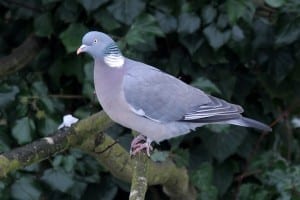
by Pigeon Patrol | Jun 6, 2016 | Bird Deterrent Products, Bird Netting, Pigeons in the News, UltraSonic Bird Control
 THE risk of being hit by pigeon droppings as you walk under a city centre bridge is set to vanish as plans get under way to bird-proof the entire structure.
THE risk of being hit by pigeon droppings as you walk under a city centre bridge is set to vanish as plans get under way to bird-proof the entire structure.
Business owners in Fisherton Street and residents living close to the railway bridge called for action in November, saying the birds had become a health hazard and people walking under the bridge need umbrellas to protect themselves.
Salisbury city councillor Matt Dean said it was the “number one issue” that residents complain to him about and has now led the way in obtaining funding from the city council to solve the problem.
He said: “It’s been an ongoing problem for 15 years or so, and now, with the opening of the University Technical College at the former police station, even more people are walking under the bridge from the rail station.
“The bulk of the money for cleaning and bird-proofing the bridge is going to be spent by the city council and we’re going to ask Network Rail for a financial contribution.
“We hope Wiltshire Council is going to assist by paying for the Traffic Regulation Order for the one or two-night road closure – but we have yet to get their agreement. We’ve gone out for tender for the work and hope it will be complete in June.”
The bridge clean and bird-proofing measures are expected to cost between £3,500 and £6,000.
Cllr Dean said: “There are a number of possible different treatments which include spikes or a special paint which is invisible to the human eye but makes buildings or statues seem like they’re on fire, if you’re a bird. The latter was successfully used about a year ago on the Poultry Cross where it was terrible but it’s now completely sorted.
“This is part of a wider programme to protect our buildings from damage by pigeons. In our historical, medieval city, we have to look after our shops and visitors.
“If you sit down and eat in the market square, you get pecked by birds. We need to work with the Business Improvement District to get rid of birds from the city centre.”
Last year, nesting peregrine falcons in the cathedral spire helped make a difference to the number of pigeons in the city but it also led to some very public executions and the council is reluctant to hire birds of prey to keep birds away.
Paul Dauwalder, who runs three businesses in the Fisherton Street, said it was fantastic news, adding: “It’s one of the weak spots in the street. People have had to walk under that awful bridge for too long and run the gauntlet from these feral pigeons.”
About Pigeon Patrol:
Pigeon Patrol Products & Services is the leading manufacturer and distributor of bird deterrent (control) products in Canada. Pigeon Patrol products have solved pest bird problems in industrial, commercial, and residential settings since 2000, by using safe and humane bird deterrents with only bird and animal friendly solutions. At Pigeon Patrol, we manufacture and offer a variety of bird deterrents, ranging from Ultra-flex Bird Spikes with UV protection, Bird Netting, 4-S Gel and the best Ultrasonic and audible sound devices on the market today.
Voted Best Canadian wholesaler for Bird Deterrent products four years in a row.
Contact Info: 1- 877– 4– NO-BIRD (www.pigeonpatrol.ca)
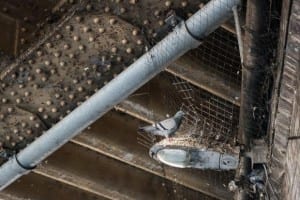
by Pigeon Patrol | Jun 5, 2016 | 4-S Gel Bird repellent, Bird Netting, Pigeon Patrol's Services
 Dead pigeons trapped under a New Malden railway bridge pose “a serious health issue” to residents, and particularly to drivers in convertible cars, a councillor has said.
Dead pigeons trapped under a New Malden railway bridge pose “a serious health issue” to residents, and particularly to drivers in convertible cars, a councillor has said.
Pigeons often become trapped in the netting beneath the bridge
Live birds can be seen sitting on piles of their own excrement under the railway line in Kingston Road, and dead ones are stuck in netting intended to have pigeon-proofed the bridge.
Beverley Ward councillor Raju Pandya said: “This is something that is a serious health issue and we are pleading with Network Rail to get this sorted.
“God help you if you’re in a convertible, they get crap on their heads.”
The birds can be seen sitting on their own excrement
Bird droppings and decaying dead birds have been a long-standing issue under the bridge, with residents and councillors first raising concerns with Network Rail in 2014.
A Network Rail spokeswoman said: “We understand the concerns of people in the area about the ongoing pigeon problem at this bridge, and are working closely with Kingston Council to resolve this.”
A dead pigeon lies on the ground having fallen from the bridge
Kingston and Surbiton MP James Berry brought representatives of Kingston Council and Network Rail to the bridge last week.
He said: “It’s absolutely disgusting, the pigeons get stuck in the netting. I was getting incredibly frustrated with the council and Network Rail.
“I just got them to come down and see it for themselves.”
About Pigeon Patrol:
Pigeon Patrol Products & Services is the leading manufacturer and distributor of bird deterrent (control) products in Canada. Pigeon Patrol products have solved pest bird problems in industrial, commercial, and residential settings since 2000, by using safe and humane bird deterrents with only bird and animal friendly solutions. At Pigeon Patrol, we manufacture and offer a variety of bird deterrents, ranging from Ultra-flex Bird Spikes with UV protection, Bird Netting, 4-S Gel and the best Ultrasonic and audible sound devices on the market today.
Voted Best Canadian wholesaler for Bird Deterrent products four years in a row.
Contact Info: 1- 877– 4– NO-BIRD (www.pigeonpatrol.ca)
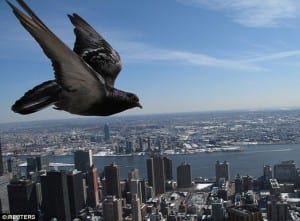
by Pigeon Patrol | Jun 4, 2016 | Bird Netting, Pigeon Patrol's Services, Pigeon Spikes
 China’s air pollution can be so dense that grey plumes are visible from space.
China’s air pollution can be so dense that grey plumes are visible from space.
But while smog can cause heart disease, lung cancer and high blood pressure in humans, it seems to make homing pigeons fly faster in one of China’s most hazy regions.
The researchers think the unexpected phenomenon may be down to a scent the birds can use to find their way home.
While smog can cause heart disease, lung cancer and high blood pressure in humans, it seems to make homing pigeons fly faster in one of China’s most hazy regions. A stock image of smog in Shanghai is pictured
Researchers from Nanjing University in China and the University of California, Los Angeles, analysed the performance of racing or ‘homing’ pigeons taking part in races on the North China Plain.
The birds are known for their ability to find their way back home at speeds of around 37mph (60km/h) and were famously used in both World Wars because of their reliability.
The researchers used publicly available data gathered from pigeon racing agencies as well as environmental organisations in the autumns of 2013 and 14 to analyse the speed of the birds in the region, where smog is usually thicker than in other parts of the vast country.
When looking for correlations between the birds’ times and pollution levels, they expected to see a drop in performance.
The researchers used publicly available data from pigeon racing agencies as well as environmental organisations to analyse the speed of the birds. Contrary to their expectations, pigeons homed significantly faster in polluted conditions. These charts show the varying correlations depending on other conditions
WHY DO THE PIGEONS FLY FASTER?
Navigational advantage:
The smell of smog, which is composed of organic particles in China, may help the birds navigate.
‘While air pollution cannot enhance vision, it might enhance olfactory navigation efficiency by providing supplemental olfactory cues to home,’ the study says.
Motivation:
Alternatively, the researchers think the birds dislike the smog and are simply upping their speed to fly out of it as soon as possible.
‘Decreased homing time under air pollution could be explained by an enhanced motivation to home; a possibility proposed several years ago that remains untested,’ they write.
‘Air pollution might be an indication of poor environmental quality, which might trigger rapid escape.’
The birds many want to get out of the smog to avoid predators surprising them in poor visibility too.
‘By homing faster when flying through haze pollution, pigeons reduce the relative amount of time they are exposed to harmful or dangerous situations while away from the safety of their home roosts,’ the study said.
‘We might expect pollution would negatively interfere with pigeon navigation and pigeons would both fly more slowly and be less successful at returning to their home roosts when flying through more polluted air,’ the researchers wrote in the study, published in Nature’s Scientific Reports.
They considered variables including race distance, wind direction, speed, weather conditions and air quality.
Temperature was found to have no ‘significant’ effects on homing time, whereas the others either slowed the birds down or helped them get to their destination more swiftly.
The researchers added: ‘Contrary to our expectations, pigeons homed significantly faster when flying through more polluted conditions.’
Using a model, they estimated that pigeons increase their homing speed from 35 mph (55.6km/h) when flying in unpolluted conditions, to 42 mph (68.2km/h) when the pollution index hit a high score of 500.
While they are not exactly sure why smog is responsible for the performance boost, they have a couple of ideas to do with navigation and motivation.
It is generally accepted that pigeons use the sun and geomagnetic field as a compass, and visual and olfactory cues to create a map.
‘Could air pollution enhance pigeon visual and/or olfactory abilities, and by doing so explain the reduced homing time?’ the experts asked in their paper.
Because smog usually reduces visibility, particularly in North China where smoggy particles are the main pollutants, the study suggests that visual cues aren’t as important to the birds’ navigational techniques as expected, so poor visibility didn’t affect their speed.
While the experts are not exactly sure why smog is responsible for the performance boost, they suggest that the birds may fly faster than usual – and not just as efficiently – because of the smell of smog. A stock image of racing pigeons being released is shown
‘This finding is consistent with previous studies that have shown that pigeons are able to home perfectly well from unknown sites where landmarks are unfamiliar, even when flying with frosted lenses that impede vision,’ they write.
To explain why the birds may fly faster than usual – and not just as efficiently – they suggested the racing pigeons may be stimulated by the smell of smog.
‘Olfactory cues have been shown to play an important role in avian navigation, and in pigeons it is probably a fundamental homing mechanism,’ they write.
They think the organic particles that make up the smog – from burning coal and waste – may help the birds navigate by providing stronger markers for the birds to use when finding their way home.
Racing pigeons are known for their ability to find their way back home at speeds of around 37mph (60km/h) and were famously used in both World Wars because of their reliability (pictured)
‘While air pollution cannot enhance vision, it might enhance olfactory navigation efficiency by providing supplemental olfactory cues to home,’ the study continued.
Alternatively, they suggested the birds might dislike the smog and are simply upping their speed to fly out of it and get back home as soon as possible.
‘Decreased homing time under air pollution could be explained by an enhanced motivation to home; a possibility proposed several years ago that remains untested,’ they write.
‘Air pollution might be an indication of poor environmental quality, which might trigger rapid escape.’
The birds many want to get out of the smog to avoid predators surprising them in poor visibility too.
‘By homing faster when flying through haze pollution, pigeons reduce the relative amount of time they are exposed to harmful or dangerous situations while away from the safety of their home roosts,’ the study said.
About Pigeon Patrol:
Pigeon Patrol Products & Services is the leading manufacturer and distributor of bird deterrent (control) products in Canada. Pigeon Patrol products have solved pest bird problems in industrial, commercial, and residential settings since 2000, by using safe and humane bird deterrents with only bird and animal friendly solutions. At Pigeon Patrol, we manufacture and offer a variety of bird deterrents, ranging from Ultra-flex Bird Spikes with UV protection, Bird Netting, 4-S Gel and the best Ultrasonic and audible sound devices on the market today.
Voted Best Canadian wholesaler for Bird Deterrent products four years in a row.
Contact Info: 1- 877– 4– NO-BIRD (www.pigeonpatrol.ca)
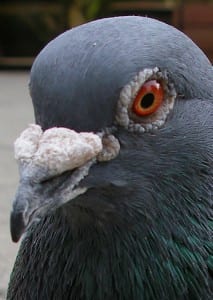
by Pigeon Patrol | Jun 3, 2016 | Bird Netting, Pigeons in the News, UltraSonic Bird Control

A pigeon.
The SPCA is investigating possible pigeon poisoning in Auckland.
The bizarre scene, observed outside Vector Arena in central Auckland on Thursday morning, was attributed by residents to the birds eating a packet of chilli instant noodles.
The ordeal began after the birds began acting strangely in the early morning.
One of the drugged pigeons
Daniel Edwards, who lived nearby, found the sickly birds near a packet of opened instant noodles and spicy seasoning.
“It’s pretty sad. A lot of people hate pigeons, but they don’t annoy me,” he said.
Edwards and his friend chased away two large gulls away that had begun clawing at the incapacitated pigeons.
Daniel Edwards found a dozen sick and dying pigeons in Auckland on Thursday morning.
One pigeon was left with a wound in his side while another bird died.
A passer-by poured water on the distressed birds to help revive them from their sluggish state.
Local resident Cynthia Dickey said this was the third time in three months pigeons had been found in a similar state in the park.
In a previous incident, she said three pigeons died and the SPCA took the remaining 12 away for treatment.
Dickey said the birds were being poisoned by the human food being left scattered around the area.
The chilli seasoning would have been dangerously spicy for pigeons, she said.
“Their little mouths can’t cope with it. It would burn your tongue.”
However, SPCA Auckland chief executive Andrea Midgen said they were investigating if the birds were poisoned.
It was the second callout the SPCA had received to the area in a few months.
“In both cases the pigeons appear to be sick from the use of poison.
“The pigeons found today were particularly sick and had wounds from being attacked by seagulls.”
The birds were taken to NZ Bird Rescue where they were being cared for.
It was legal to poison pigeons in New Zealand but you must ensure the birds don’t suffer and not leave any sick birds behind, she said.
“No animal should be left to suffer like this.”
NZ Bird Rescue Trust spokeswoman Hilary Stollery said they had been alerted to more cases of bird poisoning in recent years.
Cafe owners would poison sparrows and pigeons which were seen as a nuisance, she said.
The Trust would like the practice banned.
Human food can also be toxic to birds, including dry noodles and chili, she said.
“It would expand in the poor creature’s stomach and kill them.”
Human food high in salt and chemicals was also bad for birds.
Anyone wishing to feed birds should give them bird seed, she said.
About Pigeon Patrol:
Pigeon Patrol Products & Services is the leading manufacturer and distributor of bird deterrent (control) products in Canada. Pigeon Patrol products have solved pest bird problems in industrial, commercial, and residential settings since 2000, by using safe and humane bird deterrents with only bird and animal friendly solutions. At Pigeon Patrol, we manufacture and offer a variety of bird deterrents, ranging from Ultra-flex Bird Spikes with UV protection, Bird Netting, 4-S Gel and the best Ultrasonic and audible sound devices on the market today.
Voted Best Canadian wholesaler for Bird Deterrent products four years in a row.
Contact Info: 1- 877– 4– NO-BIRD (www.pigeonpatrol.ca)
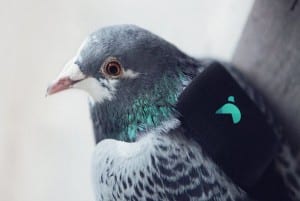
by Pigeon Patrol | Jun 2, 2016 | Animal Deterrent Products, Bird Deterrent Products, Bird Netting
 Pigeons are a nuisance in downtown North Platte. On Tuesday evening, the local city council approved a plan to get rid of them.
Pigeons are a nuisance in downtown North Platte. On Tuesday evening, the local city council approved a plan to get rid of them.
An agreement with the United States Department of Agriculture Animal and Health Inspection Service was approved on Tuesday at the regular North Platte City Council meeting. The plan is to eradicate the birds through a multi-faceted process that includes using toxicants, trapping and shooting.
Chad Richardson, district supervisor for the service, gave an overview of what needs to be done.
“The situation didn’t develop overnight and it won’t go away overnight,” Richardson said. “The goal is to reduce the population by 50 percent in the first year.”
It is estimated there are around 4,000 pigeons in the city, and Richardson said it will take putting in the man hours to accomplish the goal. Eventually, he believes the service can reduce the population by 90 percent. In Scottsbluff, the service successfully eradicated all but a handful of 2,000 pigeons in that city.
“Toxicant baiting is the key,” Richardson said. “Trapping and shooting is much more labor intensive.”
The toxicant is used after the birds have been baited with corn. Then corn is soaked in the liquid toxicant and the birds eat the tainted feed.
“We have a toxicant that is registered just to the USDA,” Richardson said. “It’s a good toxicant, if there is such a thing. There is no secondary toxicity to these birds. It is different toxicant than what private controllers have used in the past.”
The effect on the birds is that they die in their sleep due to liver failure. There will be dead birds, but the service will remove the birds as they are found. The toxicant does not stay toxic after the bird dies, so people or pets that come in contact with the dead birds are not in any danger.
“Great Plains Health and the Ag Valley Co-op have agreed to share the cost of the service,” City Administrator Jim Hawks said. “The cost will be split three ways with the city.”
About Pigeon Patrol:
Pigeon Patrol Products & Services is the leading manufacturer and distributor of bird deterrent (control) products in Canada. Pigeon Patrol products have solved pest bird problems in industrial, commercial, and residential settings since 2000, by using safe and humane bird deterrents with only bird and animal friendly solutions. At Pigeon Patrol, we manufacture and offer a variety of bird deterrents, ranging from Ultra-flex Bird Spikes with UV protection, Bird Netting, 4-S Gel and the best Ultrasonic and audible sound devices on the market today.
Voted Best Canadian wholesaler for Bird Deterrent products four years in a row.
Contact Info: 1- 877– 4– NO-BIRD (www.pigeonpatrol.ca)

 THE risk of being hit by pigeon droppings as you walk under a city centre bridge is set to vanish as plans get under way to bird-proof the entire structure.
THE risk of being hit by pigeon droppings as you walk under a city centre bridge is set to vanish as plans get under way to bird-proof the entire structure.

 Dead pigeons trapped under a New Malden railway bridge pose “a serious health issue” to residents, and particularly to drivers in convertible cars, a councillor has said.
Dead pigeons trapped under a New Malden railway bridge pose “a serious health issue” to residents, and particularly to drivers in convertible cars, a councillor has said.
 China’s air pollution can be so dense that grey plumes are visible from space.
China’s air pollution can be so dense that grey plumes are visible from space.


 Pigeons are a nuisance in downtown North Platte. On Tuesday evening, the local city council approved a plan to get rid of them.
Pigeons are a nuisance in downtown North Platte. On Tuesday evening, the local city council approved a plan to get rid of them.